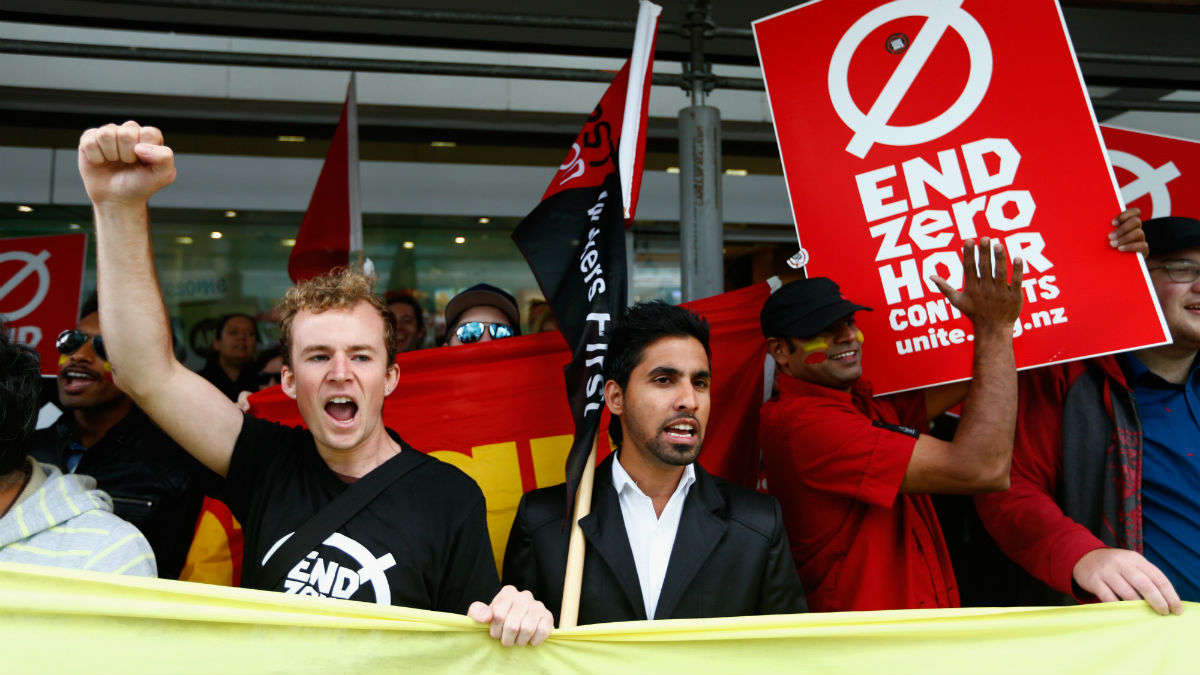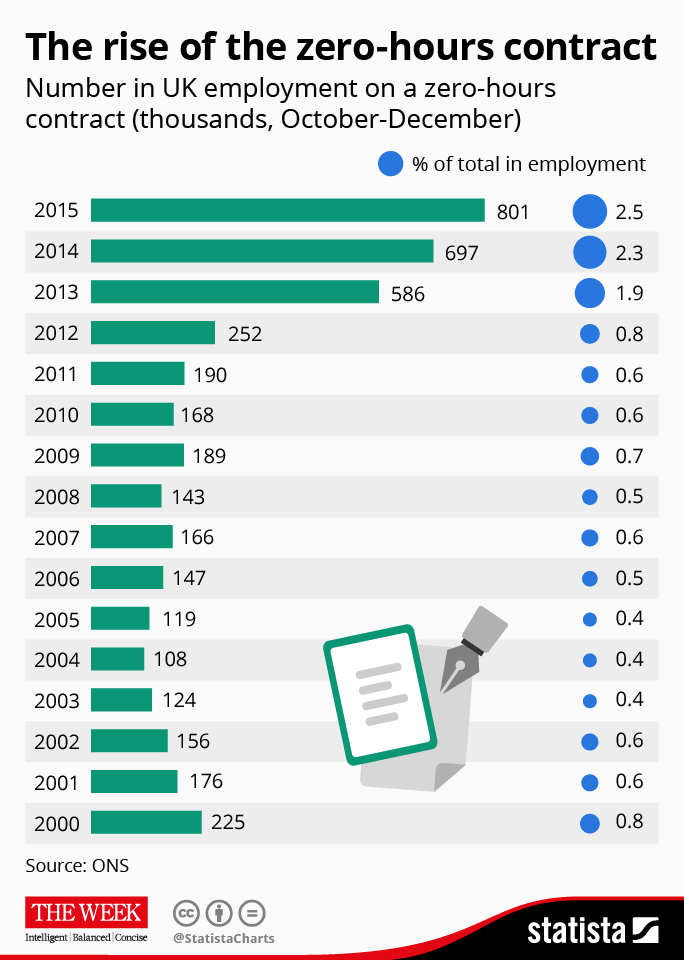Jeremy Corbyn hails New Zealand's ban on zero-hours contracts
Victory for trade unions as country passes legislation that will guarantee workers a set number of hours each week

A free daily email with the biggest news stories of the day – and the best features from TheWeek.com
You are now subscribed
Your newsletter sign-up was successful
Jeremy Corbyn has praised New Zealand's historic step of banning zero-hours contracts.
The ban was passed with support from political parties across the board following a year-long campaign by unions on behalf of workers in sectors such as fast-food, security and cleaning, reports The Guardian. Employment contracts that do not guarantee set hours will be barred effective from April.
"This is an incredible victory and I am still shocked by it, to be honest. The fact that the ban was unanimously supported in parliament is pretty unbelievable," said Mike Treen of the Unite union, which led the campaign.
The Week
Escape your echo chamber. Get the facts behind the news, plus analysis from multiple perspectives.

Sign up for The Week's Free Newsletters
From our morning news briefing to a weekly Good News Newsletter, get the best of The Week delivered directly to your inbox.
From our morning news briefing to a weekly Good News Newsletter, get the best of The Week delivered directly to your inbox.
Employers will now have to guarantee all workers a set number of hours a week and will not be able to penalise those who do not accept extra hours. The change is part of a package of measures that also includes extended paid parental leave.
Zero-hours contracts have become a touch-stone issue in recent years and are a key area of contention in the UK, where official figures yesterday showed their number had risen above 800,000 for the first time. While some praise their flexibility, there are complaints that hours are erratic and workers are forced to be available at the whim of employers.
The move was greeted with delight by Corbyn, with the Labour leader tweeting that it showed what is possible "when you put your mind to it".
The government has previously argued that the number of workers on zero-hours contracts make up a tiny part of an expanding workforce and that most people value the flexibility they afford. It has said the imposition of onerous rules could discourage firms from taking on additional workers.
A free daily email with the biggest news stories of the day – and the best features from TheWeek.com
According to the Office for National Statistics, the number of people on zero-hours contracts in the UK rose 15 per cent on an annual basis to 801,000 between October and December last year. This accounts for around 2.5 per cent of the workforce.
Zero-hours contracts rise above 800,000 for the first time
10 March
A record number of people in the UK are working on zero-hour contracts, with figures from the Office of National Statistics showing an increase of more than 15 per cent in the past year.
From October to December, 801,000 people were employed on the contracts, under which they commit to being available but are not guaranteed hours. That was an increase of 104,000 from the same period in 2014.
Zero-hours employees now make up 2.5 per cent of the workforce, up from 2.3 per cent last year and 1.9 per cent in 2013. In every other year since the turn of the century, the percentage was below one per cent – and was just 0.4 per cent between 2003 and 2005.

Those on zero-hour contracts are most likely to be young people wishing to work part-time hours, such as students. The youngest people in the workforce make up a "huge" percentage of those affected, says The Independent, with some 38 per cent being aged between 16 and 24. Almost a quarter are in full-time education.
Research released by the TUC suggests the average weekly earnings for workers on zero-hours contracts is just £188, compared to £479 for permanent staff.
The government has repeatedly asserted that the vast majority of new jobs created in recent years are full-time and that much zero-hours work is undertaken out of choice by those who value the flexibility. A survey undertaken by the Chartered Institute of Personnel and Development last year found job satisfaction was higher among such workers than those in permanent jobs.
Infographic by www.statista.com for TheWeek.co.uk.
-
 Switzerland could vote to cap its population
Switzerland could vote to cap its populationUnder the Radar Swiss People’s Party proposes referendum on radical anti-immigration measure to limit residents to 10 million
-
 Political cartoons for February 15
Political cartoons for February 15Cartoons Sunday's political cartoons include political ventriloquism, Europe in the middle, and more
-
 The broken water companies failing England and Wales
The broken water companies failing England and WalesExplainer With rising bills, deteriorating river health and a lack of investment, regulators face an uphill battle to stabilise the industry
-
 Labour shortages: the ‘most urgent problem’ facing the UK economy right now
Labour shortages: the ‘most urgent problem’ facing the UK economy right nowSpeed Read Britain is currently in the grip of an ‘employment crisis’
-
 Will the energy war hurt Europe more than Russia?
Will the energy war hurt Europe more than Russia?Speed Read European Commission proposes a total ban on Russian oil
-
 Will Elon Musk manage to take over Twitter?
Will Elon Musk manage to take over Twitter?Speed Read The world’s richest man has launched a hostile takeover bid worth $43bn
-
 Shoppers urged not to buy into dodgy Black Friday deals
Shoppers urged not to buy into dodgy Black Friday dealsSpeed Read Consumer watchdog says better prices can be had on most of the so-called bargain offers
-
 Ryanair: readying for departure from London
Ryanair: readying for departure from LondonSpeed Read Plans to delist Ryanair from the London Stock Exchange could spell ‘another blow’ to the ‘dwindling’ London market
-
 Out of fashion: Asos ‘curse’ has struck again
Out of fashion: Asos ‘curse’ has struck againSpeed Read Share price tumbles following the departure of CEO Nick Beighton
-
 Universal Music’s blockbuster listing: don’t stop me now…
Universal Music’s blockbuster listing: don’t stop me now…Speed Read Investors are betting heavily that the ‘boom in music streaming’, which has transformed Universal’s fortunes, ‘still has a long way to go’
-
 EasyJet/Wizz: battle for air supremacy
EasyJet/Wizz: battle for air supremacySpeed Read ‘Wizz’s cheeky takeover bid will have come as a blow to the corporate ego’